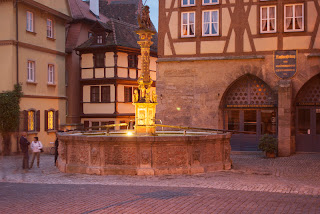 |
| St George fountain (1608), 8 meters (26 ft) deep, with a capacity of 100, 000 liters. |
 |
| In good weather, cafes are everywhere. |
 |
| Stroll the old market square. The buildings date from the Renaissance. |
 |
| ...or sit in the market square and enjoy a cup. |
(more photos follow this sparkling epistle to travelers)
Rothenburg,
pronounced Row-ten-burk, is one of the primo tourist attractions in all
of Europe. Amazing that it is not
yet a UNESCO World Heritage Site.
When people first began to stack rocks and roast deer in
Rothenburg, Native Americans were running rampant through Manhattan, Conquistadores were searching in vain for the cities of gold, and the U.S. wouldn’t be a nation for
another five hundred years. Lots
of cities in Europe make the same boast; however, most don’t have a well-preserved
medieval wall. I’m not talking
about a collection of loosely organized stacks of rocks, but a well laid out
town, with a high, unbroken wall, complete with towers, narrow gates,
half-timbered buildings galore, and cobblestone streets. In the past few hundred years, they’ve
added some swank hotels, restaurants and shops, and cappuccino emporiums
bubbling out onto the market square.
While I’m a fan of cobblestone streets in theory, the
reality is, they’re tough on your feet and ankles, unless you were born in the
12th Century and feature cobblestones as a significant improvement
over muddy lanes, slick with horse droppings, and smelling of garbage and human
feces. Ah, the good old days. Take a deep breath.
Why here? Why
did a city arise and prosper just above a small, insignificant river? As the realtor said, location,
location, etc. Seems the east-west
trade route from Turkey to Paris intersected the north-south trade route just a
few hundred meters outside of Rothenburg.
The city of 5,000 folk prospered.
Until the middle of the Thirty Years War, when a Catholic army, through
a stroke of bad luck, came to this Protestant town.
General Tilly, with his army of some 40,000 was passing by
in 1631 when a drenching rain turned the roads to brown muck, stalling caissons
and cannon, and bringing the army to a dead stop. Unlucky for Rothenburg. What to do with an army of that size
that needed feeding and housing?
Send word to the town to surrender.
Tilly didn’t get the answer he expected. Siege and victory. Rape, pillage, and plunder followed,
and afterwards the black plague delivered a second crippling blow, bringing
ruin and two hundred and fifty years of poverty. But, everything has a bright side. The city grew no more.
The walls remained, preserved until the present day.
Later, tourism peeped in, with a joyous smile, and saved the
fortunes of the town.
There are a number of interesting stories about Rothenburg,
one of which occurred during the last days of the Second World War. But, you really need to visit this fine
old city, take a room for a night or two, enjoy some Franconian beer and wine,
and by all means go on a tour at dusk with Hans Georg Baumgartner, The Night
Watchman. He’s been plying his trade for some twenty years. As everyone knows, the watchman sees
all and in this case tells all.
History delivered with wry sense of humor right out of the Borsht Belt. Secrets of Rothenburg
revealed.
Walk the walls, visit the Kriminalmuseum and see how justice
has changed, not always for the better.
Check out the ‘twin violins’ that latched people together until they
could agree to get along and stop arguing. Let’s take a collection and send a few hundred pair to
Congress.
Visit St Jacob’s Church, as magnificent as any
cathedral. Take a chance and go to
hell…..an inn called Hell, that is.
What kind of money are we talking about? Rooms run from the super reasonable, to
the super expensive. Bed and
Breakfasts abound. Eat well for a
hundred dollars, or for five dollars.
This city doesn’t gouge its guests, it welcomes them, and has since the
12th Century.
 |
| View from the Palace Gardens. The Palace itself was destroyed in an earthquake. |
 |
| A small view of the magnificent wall. |
 |
| Also destroyed in the 1356 earthquake, the prison was rebuilt in 1400. |
 |
| Beauty, beauty everywhere. |
 |
| Walk the wall for views like this. |
 |
| The Night Watchman, a tour not to be missed. |

Your pictures are always so awesome! Looks like a fun summer over there :)
ReplyDelete